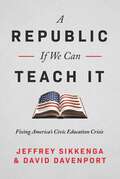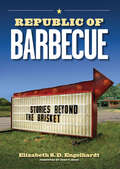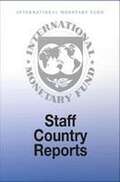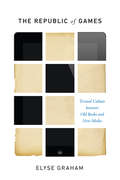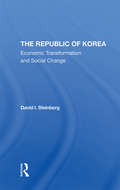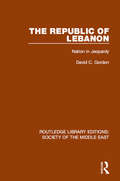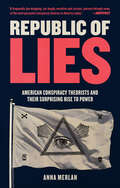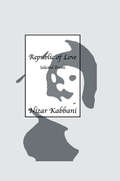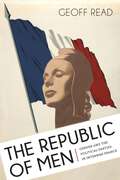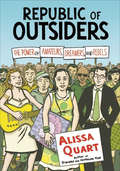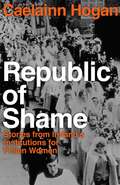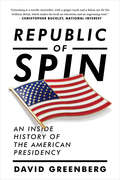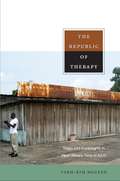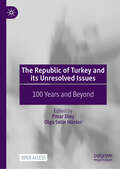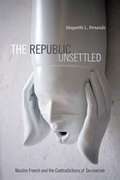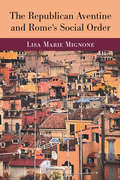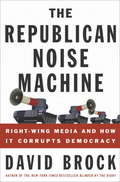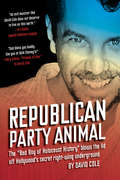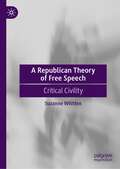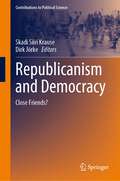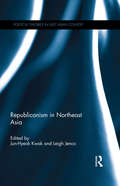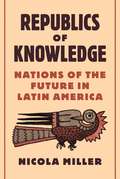- Table View
- List View
A Republic, If We Can Teach It: Fixing America's Civic Education Crisis
by David Davenport Jeffrey SikkengaAmerica faces a crisis in civic education that imperils the long-term health of our country. Too many Americans—especially young people—do not have the knowledge of our history and principles necessary to sustain our republic.Recent national test results reveal the sad state of civic education in our schools. The 2022 report of the National Assessment of Educational Progress showed that only 22 percent of eighth graders tested were &“proficient&” or better in their knowledge of civics, and proficiency in US history dropped to an anemic 13 percent. The Annenberg Policy Center reported in 2019 that only 39 percent of Americans could name the three branches of government, while its 2017 study showed that 37 percent could not name a single right in the First Amendment. How can we &“keep&” a republic, as Benjamin Franklin put it, if we don&’t know what a republic is? At a deeper level, the crisis is not simply about facts and information. If the next generations of Americans do not come to understand that our history and principles are good and that they merit their affection, our experiment in self-government could fail. Action is needed now to reverse the trend.
Republic of Barbecue: Stories Beyond the Brisket (Bridwell Texas History Series)
by Elizabeth S. D. EngelhardtIt's no overstatement to say that the state of Texas is a republic of barbecue. Whether it's brisket, sausage, ribs, or chicken, barbecue feeds friends while they catch up, soothes tensions at political events, fuels community festivals, sustains workers of all classes, celebrates brides and grooms, and even supports churches. Recognizing just how central barbecue is to Texas's cultural life, Elizabeth Engelhardt and a team of eleven graduate students from the University of Texas at Austin set out to discover and describe what barbecue has meant to Texans ever since they first smoked a beef brisket. Republic of Barbecue presents a fascinating, multifaceted portrait of the world of barbecue in Central Texas. The authors look at everything from legendary barbecue joints in places such as Taylor and Lockhart to feedlots, ultra-modern sausage factories, and sustainable forests growing hardwoods for barbecue pits. They talk to pit masters and proprietors, who share the secrets of barbecue in their own words. Like side dishes to the first-person stories, short essays by the authors explore a myriad of barbecue's themes-food history, manliness and meat, technology, nostalgia, civil rights, small-town Texas identity, barbecue's connection to music, favorite drinks such as Big Red, Dr. Pepper, Shiner Bock, and Lone Star beer-to mention only a few. An ode to Texas barbecue in films, a celebration of sports and barbecue, and a pie chart of the desserts that accompany brisket all find homes in the sidebars of the book, while photographic portraits of people and places bring readers face-to-face with the culture of barbecue.
Republic of Barbecue: Stories Beyond the Brisket (Bridwell Texas History Series)
by S. D. EngelhardtExplore the world of barbecue as food and culture through first-person stories from pit masters, barbecue joint owners, sausage makers, and wood suppliers.It’s no overstatement to say that the state of Texas is a republic of barbecue. Whether it’s brisket, sausage, ribs, or chicken, barbecue feeds friends while they catch up, soothes tensions at political events, fuels community festivals, sustains workers of all classes, celebrates brides and grooms, and even supports churches. Recognizing just how central barbecue is to Texas’s cultural life, Elizabeth Engelhardt and a team of eleven graduate students from the University of Texas at Austin set out to discover and describe what barbecue has meant to Texans ever since they first smoked a beef brisket.Republic of Barbecue presents a fascinating, multifaceted portrait of the world of barbecue in Central Texas. The authors look at everything from legendary barbecue joints in places such as Taylor and Lockhart to feedlots, ultra-modern sausage factories, and sustainable forests growing hardwoods for barbecue pits. They talk to pit masters and proprietors, who share the secrets of barbecue in their own words. Like side dishes to the first-person stories, short essays by the authors explore a myriad of barbecue’s themes—food history, manliness and meat, technology, nostalgia, civil rights, small-town Texas identity, barbecue’s connection to music, favorite drinks such as Big Red, Dr. Pepper, Shiner Bock, and Lone Star beer—to mention only a few. An ode to Texas barbecue in films, a celebration of sports and barbecue, and a pie chart of the desserts that accompany brisket all find homes in the sidebars of the book, while photographic portraits of people and places bring readers face-to-face with the culture of barbecue.“This beautiful collection, colorful enough to display as a coffee-table book, contributes significantly to the oral history tradition and the study of barbecue simultaneously.” —Journal of American Folklore“Tar Heels probably shouldn’t own up to liking Texas barbecue, but we have no hesitation about saying that we love this book about it. The voices of the folks who make it happen and this book’s wonderful photographs add up to a splendid portrait of Lone Star barbeculture.” —John Shelton Reed and Dale Volberg Reed, authors of Holy Smoke: The Big Book of North CarolinaBarbecue
Republic of Equatorial Guinea: Statistical Appendix
by International Monetary FundA report from the International Monetary Fund.
The Republic of Games: Textual Culture between Old Books and New Media
by Elyse GrahamMany of today’s digital platforms are designed according to the same model: they encourage users to create content for fun (a mode of production that some have termed playbour) and to earn points. On Facebook, for example, points are based on a user’s number of friends and how many likes and shares a comment receives. New cultural and literary formations have arisen out of these feedback and reward systems, with surprising effects on amateur literary production. <P><P> Drawing on social-text analysis, platform studies, and game studies, Elyse Graham shows that embedding game structures in the operations of digital platforms – a practice known in corporate circles as “gamification” – can have large cumulative effects on textual ecosystems. Making the production of content feel like play helps to drive up the volume of text being written, and as a result, gamification has gained widespread popularity online, especially among social media platforms, fan forums, and other sites of user-generated content. The Republic of Games argues that a consequence of this profound increase in the volume of text being produced is a reliance on self-contained, user-based systems of information management to deal with the mass of new content. <P><P> Opening up new avenues of analysis in contemporary media studies and the humanities, The Republic of Games sifts through the gamified patterns of writing, interacting, and meaning-making that define the digital revolution.
The Republic Of Korea: Economic Transformation And Social Change
by David I SteinbergThis book concentrates on the process of economic growth, for which Korea today is renowned. It examines some of the salient forces that helped to produce Korea's remarkable change and explores the evolution of the class structure in Korea and the changes it is now experiencing.
The Republic of Lebanon: Nation in Jeopardy (Routledge Library Editions: Society of the Middle East #18)
by David C. GordonTorn by civil war, its major city in shambles, and occupied by foreign peacekeeping forces as well as foreign armies, the Republic of Lebanon in the 1980s was struggling to regroup, rebuild and resolve its problems under new leadership. In this analytical survey, first published in 1983, Professor Gordon addresses such questions as why the republic – rooted in the distant past – succumbed to such disintegration. Lebanon’s multi-ethnic character and the Palestinian presence are considered fully, and Lebanon is examined in the international context, inevitably with particular reference to the creation of Israel and its consequences. The country is viewed both in its own right and also as a small skiff on a very rough regional and international sea.
Republic of Lies: American Conspiracy Theorists and Their Surprising Rise to Power
by Anna Merlan“[An] engrossing assessment of the profitable mainstreaming of conspiracy mongering in civic and political life . . . A lucid look at a slippery topic.” —Kirkus ReviewsAmerican society has always been fertile ground for conspiracy theories, but with the election of Donald Trump, previously outlandish ideas suddenly attained legitimacy. Trump himself is a conspiracy enthusiast: From his claim that global warming is a Chinese hoax to the accusations of “fake news,” he has fanned the flames of suspicion.But it was not one man alone who gave these ideas increased power. Republic of Lies looks beyond the caricatures of conspiracy theorists to explain their tenacity. Without lending the theories validity, Anna Merlan gives a nuanced, sympathetic account of the people behind them, across the political spectrum, and the circumstances that helped them take hold. The lack of a social safety net, inadequate education, bitter culture wars, and years of economic insecurity have created large groups of people who feel forgotten by their government and even besieged by it. Our contemporary conditions are a perfect petri dish for conspiracy movements: a durable, permanent, elastic climate of alienation and resentment. All the while, an army of politicians and media figures have peddled fear to serve their own ends.Bringing together penetrating historical analysis and gripping on-the-ground reporting, Republic of Lies transforms our understanding of American paranoia.“A captivating book that illuminates the landscape of conspiracy theories and what they might say about society as a whole.” —New York Magazine
Republic Of Love
by NizarFirst published in 2005. Routledge is an imprint of Taylor & Francis, an informa company.
The Republic of Men: Gender and the Political Parties in Interwar France
by Geoff ReadIn The Republic of Men, Geoff Read explores the intersection of gender bias and the eight most important political parties in interwar France, breaking new scholarly ground in profound ways. The first to compare gender discourse across the political spectrum in a national context and trace the origins of the fascist "new man" in other political traditions, Read evaluates the impact of gender discourse upon policy during a pivotal period in French history.Skillfully exploring how differing political traditions -- from left to right -- influenced and reacted to each other, Read shows that regardless of the party, predominant notions of gender manifested themselves in misogyny and double standards when it came to women's emancipation. Despite the hostility of male politicians and party members, and despite women's exclusion from both parliament and the vote, Read argues that women were nonetheless crucial to politics and visibly prominent within almost every political party in interwar France. Read explains this seeming contradiction by demonstrating the existence of a conservative trend in gender politics that by the mid-1930s had enveloped even the Communist Party. Through his masterful analysis, Read closes significant gaps in the existing historiography and presents a truly revisionist assessment of early-twentieth-century French politics.
Republic of Moldova: Poverty Reduction Strategy Annual Evaluation Report 2005
by International Monetary FundA report from the International Monetary Fund.
Republic of Mozambique: Poverty Reduction Strategy Paper Progress Report (Review of the Economic and Social Plan for #2003)
by International Monetary FundA report from the International Monetary Fund.
Republic of Outsiders: The Power of Amateurs, Dreamers, and Rebels
by Alissa Quart&“Vivid portraits&” of individuals and subcultures by a writer who &“unmasks the assumptions we make about what counts as normal&” (The New York Times). They are outsiders who seek to redefine fields from mental health to diplomacy to music. They push boundaries and transform ideas. They include filmmakers crowdsourcing their work, transgender and autistic activists, and Occupy Wall Street&’s &“alternative bankers.&” These people create and package themselves in a practice cultural critic Alissa Quart dubs &“identity innovation.&” In this &“fascinating&” book, Quart introduces us to individuals who have created new structures to keep themselves sane, fulfilled, and, on occasion, paid. This deeply reported book shows how these groups now gather, organize, and create new communities and economies. Without a middleman, freed of established media, and highly mobile, unusual ideas and cultures are able to spread more quickly and find audiences and allies. Republic of Outsiders is a critical examination of those for whom being rebellious, marginal, or amateur is a source of strength (Barbara Ehrenreich). &“Even if you don&’t consider yourself an outsider or a rebel, Quart&’s book has several lessons for creative work, particularly when it comes to making art outside a heavily commercial system.&” —Fast Company &“One of the smartest cultural interpreters of her generation. In Republic of Outsiders, she mixes sharp-eyed analysis with an empathetic heart. The result is a great read, and a brand-new lens through which to view outsiders, insiders—and ourselves.&” —Susan Cain, author of Quiet: The Power of Introverts in a World That Can&’t Stop Talking
Republic of Shame: Stories from Ireland's Institutions for 'Fallen Women'
by Caelainn Hogan'At least in The Handmaid's Tale they value babies, mostly. Not so in the true stories here' Margaret Atwood '[A] furious, necessary book' Sinéad GleesonUntil alarmingly recently, the Catholic Church, acting in concert with the Irish state, operated a network of institutions for the concealment, punishment and exploitation of 'fallen women'. In the Magdalene laundries, girls and women were incarcerated and condemned to servitude. And in the mother-and-baby homes, women who had become pregnant out of wedlock were hidden from view, and in most cases their babies were adopted - sometimes illegally. Mortality rates in these institutions were shockingly high, and the discovery of a mass infant grave at the mother-and-baby home in Tuam made news all over the world. The Irish state has commissioned investigations. But the workings of the institutions and of the culture that underpinned it - a shame-industrial complex - have long been cloaked in secrecy and silence. For countless people, a search for answers continues. Caelainn Hogan - a brilliant young journalist, born in an Ireland that was only just starting to free itself from the worst excesses of Catholic morality - has been talking to the survivors of the institutions, to members of the religious orders that ran them, and to priests and bishops. She has visited the sites of the institutions, and studied Church and state documents that have much to reveal about how they operated. Reporting and writing with great curiosity, tenacity and insight, she has produced a startling and often moving account of how an entire society colluded in this repressive system, and of the damage done to survivors and their families. In the great tradition of Anna Funder's Stasiland and Barbara Demick's Nothing to Envy: Real Lives in North Korea - both winners of the Samuel Johnson Prize - Republic of Shame is an astounding portrait of a deeply bizarre culture of control.'Achingly powerful ... There will be many people who don't want to read Republic of Shame, for fear it will be too much, too dark, too heavy. Please don't be afraid. Read it. Look it in the eye' Irish Times'A must read for everyone' Lynn Ruane'Republic of Shame is a careful, sensitive and extremely well-written book - but it is harrowing. It would break your heart in two' Ailbhe Smyth'Hogan's captivatingly written stories of people who were consigned to what she calls the "shame-industrial complex" puts faces - many old now, and lined with pain - to the clinical data ... Brilliant' Sunday Times'Utterly brilliant. Please read it' Marian Keyes'Riveting, immensely insightful and horrifically recognisable' Emma Dabiri'[A] sensitive, can't-look-away book ... Through moving stories, Hogan shows how the past is still present' NPR
Republic of Spin: An Inside History of the American Presidency
by David Greenberg<P>In Republic of Spin—a vibrant history covering more than one hundred years of politics—presidential historian David Greenberg recounts the rise of the White House spin machine, from Teddy Roosevelt to Barack Obama. His sweeping, startling narrative takes us behind the scenes to see how the tools and techniques of image making and message craft work. We meet Woodrow Wilson convening the first White House press conference, Franklin Roosevelt huddling with his private pollsters, Ronald Reagan’s aides crafting his nightly news sound bites, and George W. Bush staging his “Mission Accomplished” photo-op. We meet, too, the backstage visionaries who pioneered new ways of gauging public opinion and mastering the media—figures like George Cortelyou, TR’s brilliantly efficient press manager; 1920s ad whiz Bruce Barton; Robert Montgomery, Dwight Eisenhower’s canny TV coach; and of course the key spinmeisters of our own times, from Roger Ailes to David Axelrod. <P>Greenberg also examines the profound debates Americans have waged over the effect of spin on our politics. Does spin help our leaders manipulate the citizenry? Or does it allow them to engage us more fully in the democratic project? Exploring the ideas of the century’s most incisive political critics, from Walter Lippmann and H. L. Mencken to Hannah Arendt and Stephen Colbert, Republic of Spin illuminates both the power of spin and its limitations—its capacity not only to mislead but also to lead.
The Republic of Therapy: Triage and Sovereignty in West Africa's Time of AIDS
by Vinh-Kim NguyenThe Republic of Therapy tells the story of the global response to the HIV epidemic from the perspective of community organizers, activists, and people living with HIV in West Africa. Drawing on his experiences as a physician and anthropologist in Burkina Faso and Cte d'Ivoire, Vinh-Kim Nguyen focuses on the period between 1994, when effective antiretroviral treatments for HIV were discovered, and 2000, when the global health community acknowledged a right to treatment, making the drugs more available. During the intervening years, when antiretrovirals were scarce in Africa, triage decisions were made determining who would receive lifesaving treatment. Nguyen explains how those decisions altered social relations in West Africa. In 1994, anxious to "break the silence" and "put a face to the epidemic," international agencies unwittingly created a market in which stories about being HIV positive could be bartered for access to limited medical resources. Being able to talk about oneself became a matter of life or death. Tracing the cultural and political logic of triage back to colonial classification systems, Nguyen shows how it persists in contemporary attempts to design, fund, and implement mass treatment programs in the developing world. He argues that as an enactment of decisions about who may live, triage constitutes a partial, mobile form of sovereignty: what might be called therapeutic sovereignty.
The Republic of Turkey and its Unresolved Issues: 100 Years and Beyond
by Pınar Dinç Olga Selin HünlerThis open access book explores the Republic of Turkey’s unresolved issues that have persisted over the past 101 years. It adopts an interdisciplinary perspective to explore the challenges facing the country to critically analyse the broader historical, political, economic, social and psychological dimensions that intersect with these challenges. It offers a rich and nuanced understanding of Turkey’s complex history and contemporary issues, covering topics that have often been undermined or silenced, including but not limited to the Armenian and Dersim genocides, xeno-racism, feminist approaches to sexual morality, queer resistances, environmental movements, and the right to the city.
The Republic Unsettled: Muslim French and the Contradictions of Secularism
by Mayanthi L. FernandoIn 1989 three Muslim schoolgirls from a Paris suburb refused to remove their Islamic headscarves in class. The headscarf crisis signaled an Islamic revival among the children of North African immigrants; it also ignited an ongoing debate about the place of Muslims within the secular nation-state. Based on ten years of ethnographic research, The Republic Unsettled alternates between an analysis of Muslim French religiosity and the contradictions of French secularism that this emergent religiosity precipitated. Mayanthi L. Fernando explores how Muslim French draw on both Islamic and secular-republican traditions to create novel modes of ethical and political life, reconfiguring those traditions to imagine a new future for France. She also examines how the political discourses, institutions, and laws that constitute French secularism regulate Islam, transforming the Islamic tradition and what it means to be Muslim. Fernando traces how long-standing tensions within secularism and republican citizenship are displaced onto France's Muslims, who, as a result, are rendered illegitimate as political citizens and moral subjects. She argues, ultimately, that the Muslim question is as much about secularism as it is about Islam.
The Republican Aventine and Rome’s Social Order
by Lisa MignoneThe Aventine--one of Rome's canonical seven hills--has long been identified as the city's plebeian district, which housed the lower orders of society and served as the political headquarters, religious citadel, and social bastion of those seeking radical reform of the Republican constitution. Lisa Marie Mignone challenges the plebeian-Aventine paradigm through a multidisciplinary review of the ancient evidence, demonstrating that this construct proves to be a modern creation. Mignone uses ancient literary accounts, material evidence, and legal and semantic developments to reconstruct and reexamine the history of the Aventine Hill. Through comparative studies of premodern urban planning and development, combined with an assessment of gang violence and ancient neighborhood practices in the latter half of the first century BCE, she argues that there was no concentration of the disadvantaged in a "plebeian ghetto." Thus residency patterns everywhere in the caput mundi, including the Aventine Hill, likely incorporated the full spectrum of Roman society. The myth of the "plebeian Aventine" became embedded not only in classical scholarship, but also in modern political and cultural consciousness; it has even been used by modern figures to support their political agenda. Yet The Republican Aventine and Rome's Social Order makes bold new claims regarding the urban design and social history of ancient Rome and raises a significant question about ancient urbanism and social stability more generally: Did social integration reduce violence in premodern cities and promote urban concord?
The Republican Noise Machine: Right-Wing Media and How It Corrupts Democracy
by David BrockIn The Republican Noise Machine, David Brock skillfully documents perhaps the most important but least understood political development of the last thirty years: how the Republican Right has won political power and hijacked public discourse in the United States.Brock, a former right-wing insider and the author of the New York Times bestseller Blinded by the Right, uses his keen understanding of the strategies, tactics, financing, and personalities of the American right wing to demonstrate how the once-fringe phenomenon of right-wing media has all but subsumed the regular media conversation, shaped the national consciousness, and turned American politics sharply to the right.Brock documents how in the last several decades the GOP built a powerful media machine--newspapers and magazines, think tanks, talk radio networks, op-ed columnists, the FOX News Channel, Christian Right broadcasting, book publishers, and high-traffic internet sites--to sell conservatism to the public and discredit its opponents. This unabashedly biased multibillion-dollar communications empire disregards journalistic ethics and universal standards of fairness and accuracy, manufacturing "news" that is often bought and paid for by a tight network of corporate-backed foundations and old family fortunes. By dissecting the appeal, techniques, and reach of the booming right-wing media market, Brock demonstrates that it is largely based on bigotry, ignorance, and emotional manipulation closely tied to America’s longstanding cultural divisions and the buying power of anti-intellectual traditionalists. From the disputed 2000 presidential election to the war with Iraq to the political battles of 2004, Brock's penetrating analysis of right-wing media theories and methodology reveals that the Republican Right views the media as an extension of a broader struggle for political power. By tracing the political impact of right-wing media, Brock shows how disproportionate conservative influence in the media is integrally linked to the Republican Right’s current domination of all three branches of government, to the propping up of the Bush administration, and to the inability of Democrats to voice their opposition to this political sea change or to compete on an even playing field.As only an ex-conservative intimately familiar with the imperatives of the American right wing could, David Brock suggests ways in which concerned Americans can begin to redress the conservative ascendancy and cut through the propagandistic fog. Writing with verve and deep insight, he reaches far beyond typical bromides about media bias to produce an invaluable account of the rise of right-wing media and its political consequences. Promising to be the political book of the year, The Republican Noise Machine will transform the raging yet heretofore unsatisfying debate over the politics of the media for years to come.
Republican Party Animal
by David Cole"David Stein brought right-wing congressmen, celebrities, writers and entertainment industry figures together for shindigs, closed to outsiders. . . . There was just one problem. Stein was not who he claimed."-The GuardianIn 2013, Republican "hero" David Stein made international headlines when he was unmasked as David Cole, the notorious Jewish Holocaust denier who made an entirely different set of headlines in the 1990s with his videos from within the gates of Auschwitz and his appearances on shows like 60 Minutes and Donahue.After a $25,000 bounty was put on his head by a violent extremist group, Cole left behind the bizarre world of Holocaust denial, a landscape populated by Hitler fetishists who Cole himself detested. Then, David Stein the Republican organizer was born.Stein soon became a major force in the closed-door world of Hollywood right-wingers-people who felt as alienated from the mainstream of their profession as Cole had felt as the lone Jewish Holocaust revisionist. Soon enough, Stein was working with major GOP power players and far-right Hollywood A-listers, creating huge private events for the West Coast GOP elite . . . until it all came crashing down when a vengeful former girlfriend outed him publicly.Condemned by those who had previously lauded him, Cole was left with nothing but his story. And here he tells it, warts and all, including the first-ever exposé of the secretive Hollywood far-right underground, "Friends of Abe."
A Republican Theory of Free Speech: Critical Civility
by Suzanne WhittenThis book offers the first comprehensive philosophical examination of the free speech ‘battles’ of the last decade, arguing for a critical republican conception of civility as an explanatory and prescriptive solution. Issues such as no-platforming and safe spaces, the increasing influence of Far-Right rhetoric on internet forums, the role of Twitter as a site of activist struggles, and the moral panics that surround ill-judged comments made by public figures, all provide a new set of challenges for society which demand a careful critical analysis. The author proposes a 'republican theory' of free speech, demonstrating how a conception of ‘critical’ civility, one which combines the importance of expressive respect with the responsibilities of contestation and vigilance, is required if we are to combat some of the most contentious speech-related conflicts facing contemporary society today.
Republicanism and Democracy: Close Friends? (Contributions to Political Science)
by Skadi Siiri Krause Dirk JörkeThis book discusses whether democracy and republicanism are identical, complementary, or contradicting ideas. The rediscovery of classic republicanism a few decades ago made it clear how profoundly modern notions of democracy had been shaped by the republican tradition. But defining these two concepts remains difficult, and the views diverge widely. The overarching aim of this book is to discuss the extent to which democracy and republicanism are identical, complementary or mutually contradicting ideals / ideas. Pursuing this open approach to the subject means calling into question a widely used formula according to which modern democracy is composed of liberal principles such as individualism, the rule of law and human rights, on the one hand, and of republican principles such as focusing on the common good and popular sovereignty, on the other. This book will appeal to students, researches, and scholars of political science interested in a better understanding of political theory and political history.
Republicanism in Northeast Asia (Political Theories in East Asian Context)
by Jun-Hyeok Kwak Leigh JencoAs rapid economic development brings increasing uncertainty in East Asia, interest in a new version of republicanism, termed iscalled neo-Roman republicanism, is growing across the region. Conceptualized as liberty as non-domination, this new form of republicanism has inspired not only Western but also East Asian political theorists. However, neo-Roman republican ideas in Northeast Asian countries continue to face serious conceptual and political challenges, which scholarly literature on both republicanism and on East Asian politics has largely failed to confront. This book addresses these challenges by surveying the latest theoretical contributions to the studies of republicanism in Western countries and the latest interpretations of how republicanism, including both communitarian republicanism and neo-Roman republicanism, has been appropriated in countries in East Asia. In particular, it deals with the key question of whether liberty as non-domination can work in non-Western contexts where the fundamental tenets of liberal democracy, such as moral individualism and value pluralism, do not predominate. Across three sections, the chapters first provide a conceptual overview of republicanism as a global political theory, they then consider how republicanism has historically been received, resisted, and translated into East Asia., and Ffinally, they examine how historically informed possibilities fit with the emergent needs of contemporary Northeast Asian societies. Overall, the contributors show that republicanism is an always-ongoing project, whose terms must be interpreted and translated into the various communities they inform. Normative considerations about whether or how republicanism applies in East Asia cannot be divorced from historical and empirical approaches which consider the various ways in which republican ideals reflect the realities of life there. Dealing with the issue of republicanism from a new, comparative perspective, this book will have broad appeal to students and scholars of Asian studies, comparative political theory, political philosophy, sociology, and history.
Republics of Knowledge: Nations of the Future in Latin America
by Nicola MillerAn enlightening account of the entwined histories of knowledge and nationhood in Latin America—and beyondThe rise of nation-states is a hallmark of the modern age, yet we are still untangling how the phenomenon unfolded across the globe. Here, Nicola Miller offers new insights into the process of nation-making through an account of nineteenth-century Latin America, where, she argues, the identity of nascent republics was molded through previously underappreciated means: the creation and sharing of knowledge.Drawing evidence from Argentina, Chile, and Peru, Republics of Knowledge traces the histories of these countries from the early 1800s, as they gained independence, to their centennial celebrations in the twentieth century. Miller identifies how public exchange of ideas affected policymaking, the emergence of a collective identity, and more. She finds that instead of defining themselves through language or culture, these new nations united citizens under the promise of widespread access to modern information. Miller challenges the narrative that modernization was a strictly North Atlantic affair, demonstrating that knowledge traveled both ways between Latin America and Europe. And she looks at how certain forms of knowledge came to be seen as more legitimate and valuable than others, both locally and globally. Miller ultimately suggests that all modern nations can be viewed as communities of shared knowledge, a perspective with the power to reshape our conception of the very basis of nationhood.With its transnational framework and cross-disciplinary approach, Republics of Knowledge opens new avenues for understanding the histories of modern nations—and the foundations of modernity—the world over.
